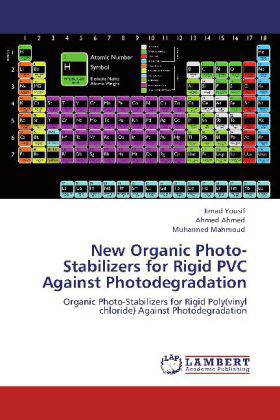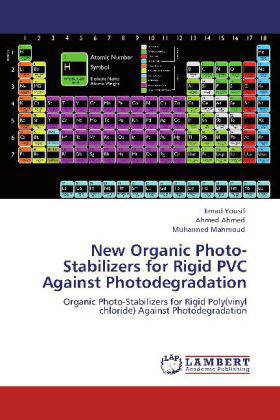
- Afhalen na 1 uur in een winkel met voorraad
- Gratis thuislevering in België vanaf € 30
- Ruim aanbod met 7 miljoen producten
- Afhalen na 1 uur in een winkel met voorraad
- Gratis thuislevering in België vanaf € 30
- Ruim aanbod met 7 miljoen producten
Zoeken
New Organic Photo-Stabilizers for Rigid PVC Against Photodegradation
Organic Photo-Stabilizers for Rigid Poly(vinyl chloride) Against Photodegradation
Emad Yousif, Ahmed Ahmed, Muhanned Mahmoud
Paperback | Engels
€ 88,45
+ 176 punten
Omschrijving
Poly(vinyl chloride), better known by its abbreviation PVC, is one of the most versatile plastics. It is the second largest manufactured resin by volume worldwide; currently, its production per annum exceeds 31 million tons. research and industrial applications, with respect to polymerization, stabilization, bulk property modification, and chemical and material recycling of PVC waste. The low cost and the good performance of poly(vinyl chloride) products have increased the utilization of this polymer in building, mainly in exterior application, such as window profiles, cladding structure and siding. However, ultimate user acceptance of the PVC products for outdoor building applications will depend on their ability to resist photodegradation over long periods of sunlight exposure. To ensure weather ability, the PVC resin needs to be compounded and processed properly, using suitable additives, leading to a complex material whose behavior and properties are quite different from the PVC resin by itself.
Specificaties
Betrokkenen
- Auteur(s):
- Uitgeverij:
Inhoud
- Aantal bladzijden:
- 200
- Taal:
- Engels
Eigenschappen
- Productcode (EAN):
- 9783659118500
- Verschijningsdatum:
- 6/05/2012
- Uitvoering:
- Paperback
- Afmetingen:
- 152 mm x 220 mm
- Gewicht:
- 299 g

Alleen bij Standaard Boekhandel
+ 176 punten op je klantenkaart van Standaard Boekhandel
Beoordelingen
We publiceren alleen reviews die voldoen aan de voorwaarden voor reviews. Bekijk onze voorwaarden voor reviews.







